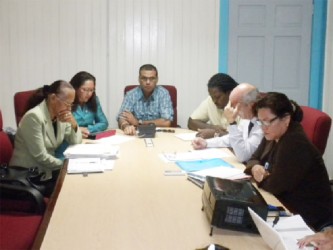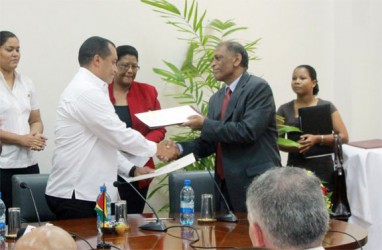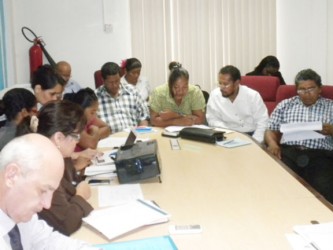Minister of Natural Resources Robert Persaud and Minister of Amerindian Affairs Pauline Sukhai yesterday met residents of Hururu, in Region 10 and personnel from RUSAL to discuss several issues to do with road access for loggers and infrastructure works, utility and other services to the village.
According to a release from the Ministry of Natural Resources and the Environment, the company is currently reviewing a proposal by the Village Council with the aim of entering into an agreement with the Council.
The residents had on April 21 staged a protest, blocking access to the access to the RUSAL-owned Bauxite Company of Guyana Inc (BCGI) mining site the Hururu, Upper Berbice River, Region 10. They were said to be fed up with the lack of progress on negotiations over rental fees and a proposal to block them from accessing a logging area slated to be a mining site. About 100 persons from the 600-plus Amerindian reservation took to protesting on that Sunday. They blocked the access road to the Kwakwani site with logs and a tractor and also the waterfront to prevent boats from landing.

The community had submitted proposals, which they deem fair, to the company following meetings with the company, which had a representative of the two concerned Government Ministries.
The residents submitted proposals requesting that $6 million be paid monthly to the community as rental of the road to Kururbuka-22 where the company’s worksite is located. They also want villagers to be given access to the road for their own logging purposes and for RUSAL to construct two alternative roads for their use so that they would not have to use the site access road.
Further, the villagers want five wells be constructed, one for each section of Hururu and for students of the village, who perform exceptionally at national examinations, to be rewarded.
One resident said that the community is a reservation and over the years RUSAL has been paying the village about $1.2 million per month for use of a road to get to its mining site. However the resident explained that almost all the money goes back into paying for the electricity the company provides. The resident said that other communities, such as Ituni and Kwakwani, pay a minimal sum.







